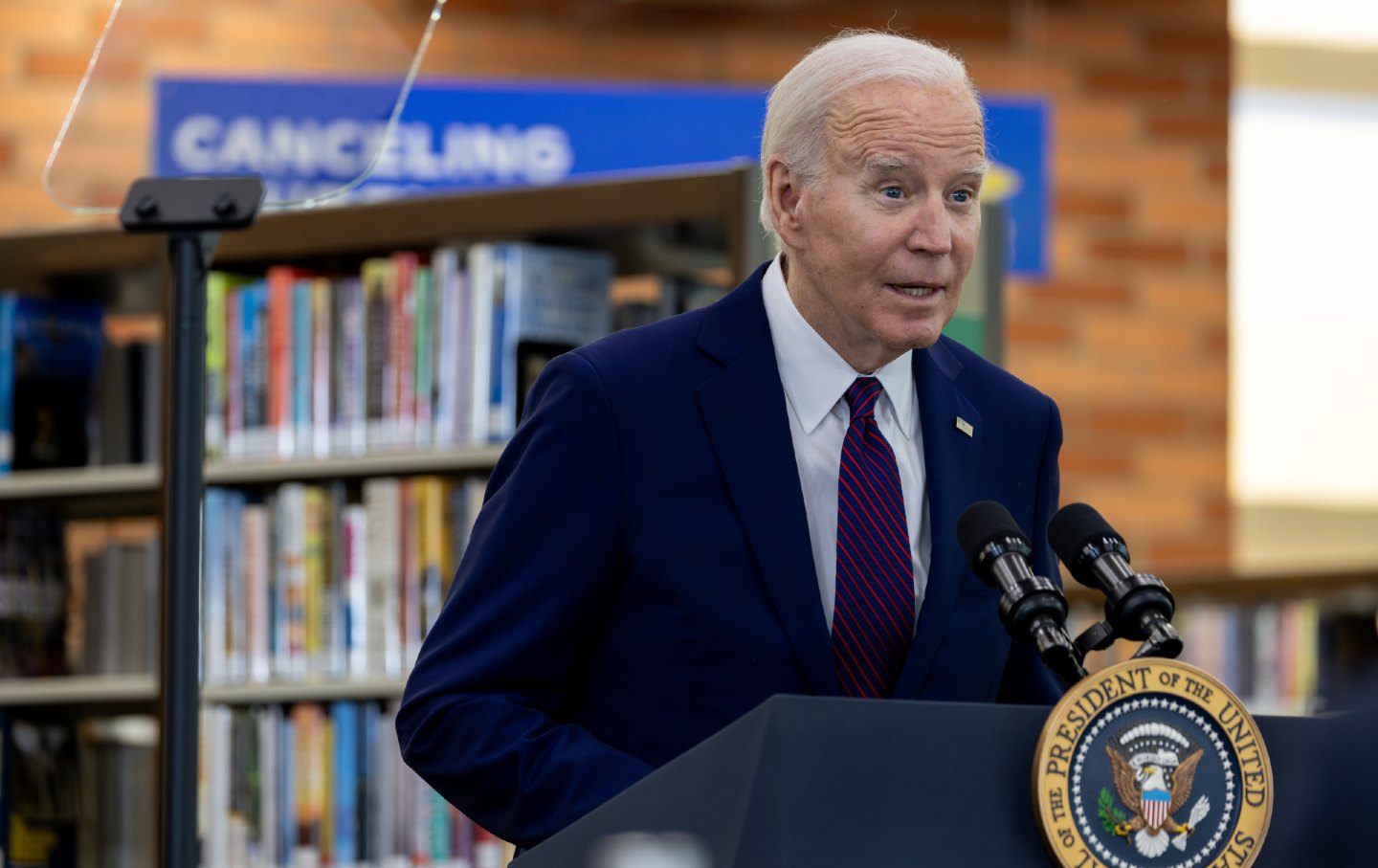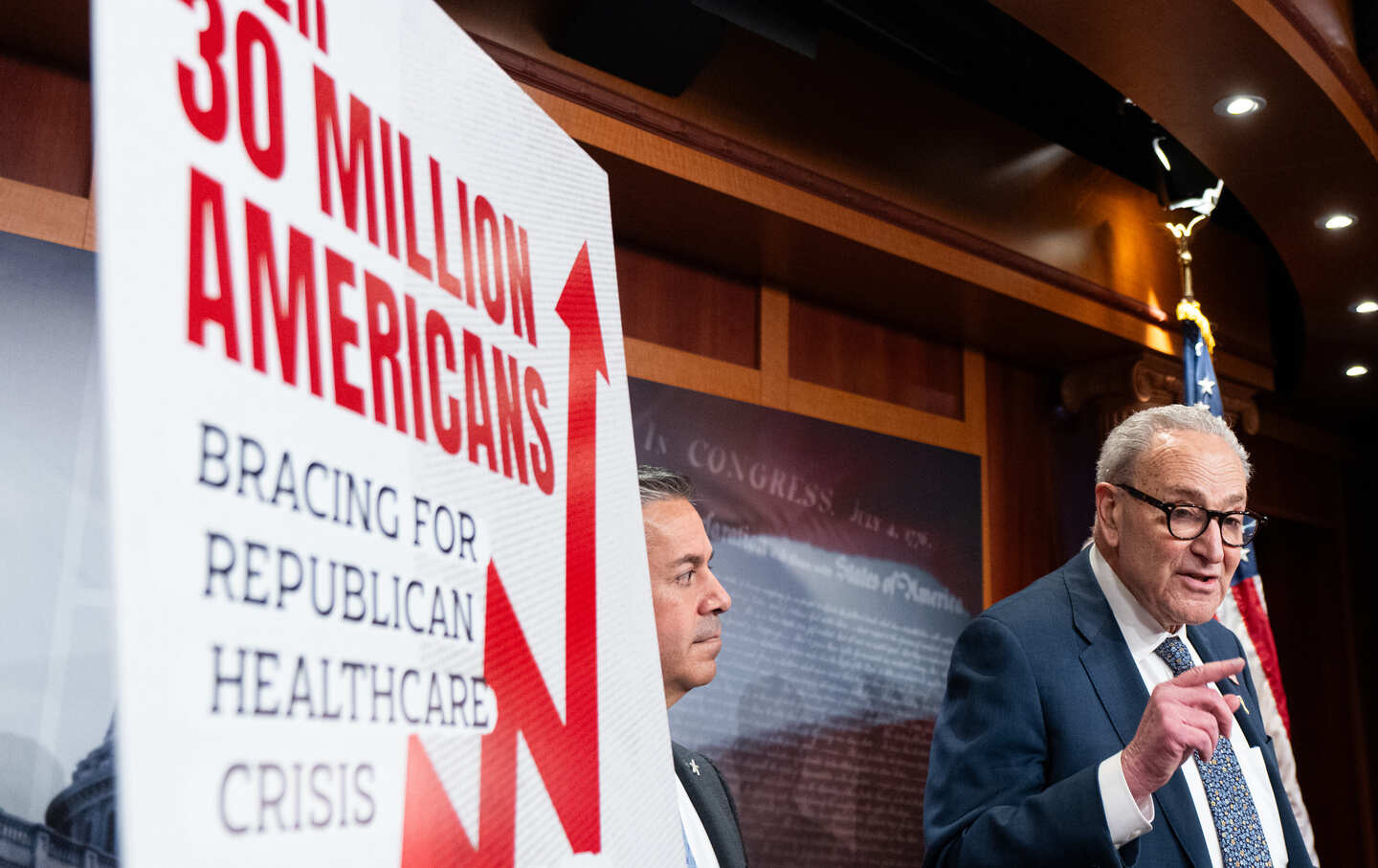What the Polls Get Wrong About Biden—Plus, Turmoil in Haiti
On this episode of Start Making Sense, Steve Phillips argues for expanding the electorate, and Amy Wilentz reports on Port-au-Prince.

Here's where to find podcasts from The Nation. Political talk without the boring parts, featuring the writers, activists and artists who shape the news, from a progressive perspective.
After gangs took over most of Port-au-Prince, Haiti’s acting prime minister, Ariel Henry, agreed to step aside. Long-time Haiti observer Amy Wilentz analyzes the forces at work shaping the country’s next steps.
Also: the polls and the pollsters are missing the political potential in 9 million people who have turned 18 since the last election. Steve Phillips explains – his book, ‘How We Win the Civil War,’ is out now in a new edition, updated for the 2024 election.
Our Sponsors:
* Check out Avocado Green Mattress: https://avocadogreenmattress.com
Advertising Inquiries: https://redcircle.com/brands
Privacy & Opt-Out: https://redcircle.com/privacy

President Joe Biden announces the cancellation of an additional $1.2 billion in student loan debt at the Julian Dixon Library in Culver City, Calif.—far from any possible protests over his policy towards Israel’s war in Gaza.
(Irfan Khan / Los Angeles Times via Getty Images)After gangs took over most of Port-au-Prince, Haiti’s acting prime minister, Ariel Henry, agreed to step aside. Longtime Haiti observer Amy Wilentz analyzes the forces at work shaping the country’s next steps.
Also on this episode: The polls and the pollsters are missing the political potential in 9 million people who have turned 18 since the last election. Steve Phillips is on the podcast to explain. His book How We Win the Civil War is out now in a new edition, updated for the 2024 election.

Here's where to find podcasts from The Nation. Political talk without the boring parts, featuring the writers, activists and artists who shape the news, from a progressive perspective.
Danny and Derek welcome to the show Julia Gledhill and Van Jackson, co-hosts of the Un-Diplomatic podcast, to talk about the Trump administration’s newly released National Security Strategy. They discuss how the document leans on civilizational framing, portrays competition as existential conflict, omits diplomacy and institutions in favor of coercion and deal-making, and deemphasizes democracy promotion. They also touch on the strategy’s treatment of Europe and Latin America, its assumptions about American power, and what the new NSS suggests about the direction of U.S. foreign policy.
Our Sponsors:
* Check out Avocado Green Mattress: https://avocadogreenmattress.com
Advertising Inquiries: https://redcircle.com/brands
Privacy & Opt-Out: https://redcircle.com/privacy
Jon Wiener: From The Nation magazine, this is Start Making Sense. I’m Jon Wiener. Later in the hour: Haiti in turmoil: Amy Wilentz has our report. But first: what the polls and the pollsters are getting wrong about how Biden can win. Steve Phillips will explain – in a minute.
[BREAK] Many polls have Biden losing if the election were held today. Four others last week had him slightly ahead. The Kaiser Family Foundation Poll showed Biden leading Trump 47 to 44, and that was before the State of the Union speech. Another poll of registered voters by Emerson College put Biden ahead 51 to 49, also before the State of the Union. Morning Consult had them tied at 43 each. But the pollsters and the pundits are missing a crucial factor: the changing composition of the American electorate. For that, we turn to Steve Phillips. He wrote the bestseller, Brown Is the New White: How the Demographic Revolution Has Created a New American Majority. He also hosts the podcast Democracy in Color, and he writes for The Guardian and The Nation. A new updated edition of his book How We Win the Civil War is being published this week. We reached him today in San Francisco. Steve Phillips, welcome back.
Steve Phillips: Thanks for having me. Glad to be here.
JW: The New York Times poll, regarded by many as the best, had Trump ahead in early March by five points among registered voters, four points among likely voters. It’s the largest lead Trump has ever had in a Times poll. But these categories, Registered Voters and Likely Voters, miss something: young people of color. What are the demographic facts here?
SP: There is no such thing as “the voters,” and yet, that’s how all of these different reporters and analysts at The Times perpetuate this myth that there’s this huge undifferentiated block of voters who swing back and forth based upon various developments in the news, or the economy, or whatever. And it’s not at all how actual elections happen. 80 plus percent of African Americans have voted Democratic in every single presidential election since we started having exit polls in 1976. And at the same time, the majority of whites have voted for Republicans in every single election since 1976. And the notion that you can just look at the voter without looking at the particular racial breakdown is what is the fundamental flaw of these analyses. What I wrote about in the first book, Brown Is the New White, was I tried to quantify what people called the Obama Coalition, what I call the New American Majority. It’s roughly 75, 77 per cent of people of color, and 38, 39 percent of whites. That coalition is a winning coalition.
JW: In The Nation, where you wrote about the recent changes in the electorate, you report on the number of new young voters of color who have come of age since the last presidential election. How many are there?
SP: There are roughly 9 million more people now eligible to vote than were eligible in 2020. And nearly 90% of them are people of color. And this is the result of the fact that that the majority of people under 18 are people of color, and legal immigration factors into that, in a world which is mainly people of color. And what people don’t want to talk about is that the reality of having the country be so racially exclusionary for so long, that the country was unnaturally white in the fifties and sixties, and before that. So most old people in this country are white. And a larger percentage of the people who are dying are white. And you combine all those together, and in today’s electorate, nearly 80% of the 9 million net new eligible voters are people of color.
JW: What is the Republican strategy towards young voters of color?
SP: The cornerstone of it is to stop people from voting: Voter suppression, depressing the vote, making it as hard as possible to vote is one critical component of that. So you stop these numbers of new people of color coming into the electorate. And then the other part is to fan the flames of white racial resentment and fear. Talk about immigration, and the border, and crime, and all these people of color are coming for you, and your family, therefore, you have to vote Republican. And it’s those two elements are the essence of what the Republican plan is, scare white people to get them to turn out, and stop people of color from voting as much as possible.
JW: Let’s just note that in 2020, it didn’t work. Biden, of course, won by 7 million votes. You say there’s 9 million more voters now, almost all of them potential Democratic voters. I want to get back to the recent polls. With that in mind, that poll that really scared the heck out of all of us was in November, New York Times survey of the six battleground states that showed Trump leading in five of them. It also showed support from voters of color cratering. What do you say to that?
SP: So that poll came out and freaked everybody out. It came out in November. It was on a Sunday it came out, and it was right before the elections in Tuesday, the 2023 elections. And those elections completely contradicted what those polls say. And the polls were saying, ‘Oh. There’s all this collapse,’ like you’re saying, cratering of support of people of color for Democrats, and therefore Trump is ahead. And yet, two days later, the Democrats took back control of the state legislature in Virginia, which is a very diverse state, and was the literal capital of the Confederacy. That was done with large turnout of voters of color. Ohio, which is a state that had been trending more conservative, voted to pass the Reproductive Rights Ballot Measure with 80% support from African Americans. Even in Mississippi, Presley, the Democratic candidate came closer than any Democratic came in ages. And in Kentucky, Beshear wins reelection, a Democrat running against a Black Republican, and a Black Trump Republican.
So if there were any state that we’re going to prove this thesis that the African Americans are gravitating towards Trump world, it would’ve been Kentucky. And yet Beshear, the white Democrat running for reelection actually increased his vote in the Blackest counties in the state. So all of the actual election results are running contrary, and contradicting these polls. And yet, because it has The New York Times banner, we assume that that’s gospel truth, and nobody ever stops the question ‘well, maybe the poll itself is incorrect, because the actual election results continue to not comport with what these polls suggest.’
JW: At The New York Times, they are of course aware of this discrepancy. Nate Cohn, chief political analyst, did come up with an argument about what happened. He said, yes, the Democrats did win a lot of surprise victories in 2023, and before that in the midterms of 2022, and in the special elections that have taken place since the repeal of Roe v. Wade. But, he argues, “These have all been lower turnout elections, where the voters tend to be highly engaged, older, highly educated voters.” New York Times chief political analyst Nate Cohn says, “Mr. Biden’s weakness is almost entirely concentrated among the less engaged, less educated segment of the electorate, including young, Black and Hispanic voters. These voters don’t participate much in special elections, or the midterms, but they do vote in presidential elections.” So, he concludes, a higher turnout among young voters of color, likely in a presidential election will hurt Biden. What’s your response to the chief political analyst of The New York Times?
SP: That’s probably the most nonsensical thing I’ve ever heard, and it’s also completely flies in the face of what all the evidentiary data shows. Biden won young people by almost 30 points. And as I was saying, the majority of people under 18, and those turning 18 are people of color. Has there been some massive shift in terms of how young people are voting? No. Not only that, on top of all of that, a lot of the young people, particularly young women post the overturning of Roe are coming out, and voting in larger numbers, and voting against the Republicans, and for the Democrats. So high turnout has never been bad for the Democrats. And if in fact there were some evidence that the young people of color were not voting for Democrats, and were voting against Democrats, then maybe you could make a logical conclusion of what Cohn is saying.
But there is no evidence of that. There’s no evidence of that in the actual elections. And even in the elections that did occur, he’s calling lower turnout. So the ballot measure piece on reproductive rights, young people, and young people of color voted on the progressive side of that. So was he saying that there’s some whole other sector of young people of color who are more conservative, but not voting, and that if they come out that’s going to hurt? So none of that makes any sense, and it’s completely contradicted by actual voter behavior, and that there’s very little that Trump is doing that is attracting young people. He’s actually repelling them, as he tries to appeal to the fears of older people.
JW: When the so-called experts express doubts about the strategy of maximizing voting by people of color, something the Democrats should do, they point to Stacey Abrams’ loss of the Georgia Governor’s race in 2020. Stacey Abrams, you and I have talked about her here many times, was the magnificent leader and candidate. She had spent a decade on the project that you are talking about registering, engaging, mobilizing people of color as voters. Understanding her loss is one of the subjects you take up in the new edition of your book How We Win the Civil War, published this week. What’s your analysis?
SP: Well, first of all, because I went on the Stacey Abrams train for a decade, and I’ve seen a lot of the lack of support and frankly desire that she failed, and that there were a lot of implications for people. And there was a very big rush thing, “Oh. See. Stacey lost.” And it affirms all of this piece. But then if you dig into the actual numbers, two things about Stacey’s race, or about that Stacey’s race, about the Georgia race, people like to skip over Raphael Warnock getting reelected. You have the literal successor to Martin Luther King Jr., the man who stands in the pulpit that King stood in at Ebenezer Baptist Church winning I believe it’s five elections in two or three years in Georgia for the US Senate. And Warnock stands on the platform that Stacey built. And you can’t say, “Oh. Well Stacey lost, and that disproves everything,” because Warnock won, and he’s won repeatedly. And he has shown that this coalition of maximized people of color and progressive whites is a winning formulation.
JW: So Raphael Warnock won the same election that Stacey Abrams lost. Turns out that’s the problem that we need to understand. What’s your analysis there?
SP: What’s the biggest difference between Stacey Abrams and Raphael Warnock? Stacey Abrams is a woman, and Raphael Warnock is a man. The United States of America has never ever elected a Black woman governor of any state. And that remains the case. And we can’t just ignore that reality of what one of my friends referred to as misogynoir, and it bears itself out in the numbers. Stacey and Warnock got the same percentage of the Black vote, but Stacey got 5% less of the white vote, and that was what the difference was. And how that then disproves Stacey’s theory around you mobilize voters of color? I don’t know. The question is why did that 5% of white voters not also cast their ballot for Stacey in the way that they did for Warnock?
JW: You can read all about it in the just published new edition of Steve Phillips’ book How We Win the Civil War. Want to return to the present, and the current presidential campaign. Democrats know that Biden beat Trump by 7 million votes in 2020, but they are worried that the 2020 Biden voters will switch to Trump in 2024, or maybe not vote at all, because Biden is too old. In 2020, Biden won Black voters by a 75-point margin, Latino voters by a 33-point margin, Asian voters by a 27-point margin, according to exit polls. What do we know about vote switching between presidential elections? How many people who supported one party last time support the opponents the next time?
SP: There is no more vote switching. The American national education, this is thesis that I laid out in The Nation column that I wrote, about how Biden actually should be being seen as the front-runner. And this constellation of political scientists that do the regular polls, that analyze elections, and everyone agrees that this is the gold standard. And we print this poll in the latest Nation piece, the percentage of voters who are swing voters has dropped almost to 5% of the voters, and that there was a quote in the, let’s see. It was a different New York Times reporter was quoting the director of Monmouth University’s Polling Institute said they’re asking who the swing voters are. He says, “Do you want me to name them individually, because I probably could at this point.” So there are not swing voters is any meaningful sense. The real issue is, are people going to come out and vote period? Those remain the Biden campaign’s challenge both in terms of enthusiasm, as well as in terms of the voter suppression that we have to deal with.
JW: I’ll just add the people who call themselves Independents, turns out almost all of them vote the same way they voted last time.
SP: Exactly.
JW: They like to think of themselves as Independent, but really, they’re either Democrats or Republicans.
SP: The label belies the actual behavior. And the assumption is, “Oh. They’re Independent. They swing back and forth,” but they don’t.
JW: So it’s eight months till election day. Biden went to Georgia after the State of the Union speech on Thursday. Georgia’s largest political action committees representing communities of color endorsed him and pledged $30 million to mobilize communities of color to vote in 2024. This is the Collective PAC, African Americans, the Latino Victory Fund, and the AAPI Victory Fund for Asian Americans. It seems like you’re not the only one who has this idea.
SP: I think people get it. A larger percentage of people are actually getting it. It does still remain the point that Democrats, and even the Biden campaign, needs to be pushed on. When Obama won places like Florida, and even Ohio, he had 1,000 people on the ground going door to door in every single county. Is the Biden campaign going to staff up, and scale up, and invest in places such as Georgia? And I’ve heard some things that some of the top Democrats are not prioritizing Georgia in a way that I can’t even understand. So that needs to be something that we continue to push and pressure on the administration.
JW: Steve Phillips: his book How We Win the Civil War is out this week in a new edition for the 2024 election, and he wrote for The Nation about How Biden Can Win. Read him at thenation.com. Steve, thanks so much for talking with us today.
SP: Thanks for having me on. I enjoyed it.
[BREAK}
Jon Wiener: Haiti is front page news this week, and for that story, we turn, of course, to Amy Wilentz. She’s written two books about Haiti, most recently the award-winning Farewell, Fred Voodoo, and before that, The Rainy Season. She was also Jerusalem correspondent for The New Yorker. Her journalism has also appeared in The Atlantic, The LA Times and The New York Times, and she’s a longtime contributing editor at The Nation. She’s also a 2020 Guggenheim fellow, and she teaches in the Literary Journalism program at UC Irvine. Amy, welcome back.
Amy Wilentz: Thank you, Jon.
JW: Haiti has been in what you could call a downward spiral for a long time now. We’ve talked about it every few months, and there’s never any good news. It has no elected government. For the last two and a half years, the US has supported Ariel Henry as de facto Prime Minister. Last time we talked, which was a month ago, he had gotten the US and the UN to support sending 1,000 policemen from Kenya to Port-au-Prince to try to control the gangs that were wreaking havoc in the capitol. I understand Ariel Henry went to Kenya last week to sign the deal. Then what happened?
AW: He went, he shook a lot of hands, he looked extremely presidential. Meanwhile, the whole country was exploding, and then Ariel Henry made the mistake of going to the United States before he went back to Haiti. While Haiti was in the throes of terrible unrest in the capital, everybody in the prisons left the prisons, fighting in the streets, burning of buildings, attacks on Haitian police officers. And so Ariel Henry tried to get back into Haiti, and the gangs who are running Haiti right now from the streets don’t want Ariel Henry on the premises. So they went to the international airport, they shut it down, and they shot at it and burned parts around it. And then the Dominican Republic, which shares the island with Haiti, said they would not allow Ariel Henry’s plane to land in the Dominican Republic. A decision made, supposedly, I have heard, while the plane was landing, and the plane had to then lift itself up from its landing pattern and it went to, they decided to go to Puerto Rico, an American-held territory, as we all know, and that’s where he is now.
JW: What do we know about the situation in Port-au-Prince today? We’re speaking on Monday afternoon.
AW: Well, everything’s in a situation of both violence and stasis. Right now, today, there’s a big meeting in Jamaica of CARICOM. It’s a Caribbean trade organization that includes almost every state in the Caribbean, including Haiti. The Americans are going to be there, Anthony Blinken. Meanwhile, in Port-au-Prince prisons have been opened, the prisoners have left, a lot of those prisoners were put in there as leaders of various gangs or assistant leaders of various gangs. So this is a lot of heavy hitters who got out of prison, as well as the usual run-of-the-mill person who was never even charged with anything. And they’re in the streets, police headquarters are under siege by the gangs, and the gangs have sort of come to various coalitions that are now attempting to wield political power.
JW: I understand there’s an alliance of nine gangs called the G9, and they have a leader.
AW: Well, that is Jimmy Cherizier. His nickname is ‘Barbecue.’ He claims that’s because he likes to grill, but other people think it’s because he likes to burn things down and burn up people. And he’s been in charge of this criminal kidnapping gang for a long time. A lot of people want to portray him as a revolutionary left leader of the Haitian people. I question this, but that is how he also wants to portray himself, and he would dearly love to be president of Haiti, I thought so when he first started appearing on the scene.
But he’s guilty of so many crimes and his gang is guilty of so many crimes. I don’t know that he really commands the Haitian people the way he says he does. Just a few months ago there was a movement called Bois Calais. Bois Calais means sort of ‘shaved stick.’ It is also a synonym for the male organ, and it was a sort of neighborhood group that gathered to attack gangsters. So I’m not sure – and they did, and they killed a lot of what Haitians call bandits, members of the gangs. At this time, I’m not sure that Cherizier, ‘Barbecue’really commands the respect of the Haitian people. Remember too that the kidnappings were not just of wealthy Haitians, outsiders, clerics from other countries as well as from Haiti, but of the average little person who had to pay ransoms too.
JW: The Guardian called Cherizier “now the most powerful man in Haiti.” I wonder if you agree?
AW: He may be, because, aside from him there’s one other person, and then there are the opposition leaders. Now the opposition leaders, some of them have connections to various gangs, but most of them don’t have any armed force at their command. So depends, what you mean by powerful. If you mean the most gun power, yeah, I think that Cherizier has that.
There’s also the former coup plotter, Guy Philippe, who was a participant in the second coup against Jean-Bertrand Aristide, the freely and fairly elected president of Haiti at the time. So Guy Philippe was in prison in the United States for seven years on charges of money laundering for the cartels in Haiti, and he was in Miami and indicted and convicted, and was in prison. And then suddenly three months ago, he was deported by the United States into the maelstrom that is Haiti, and he’s somewhat popular himself and he has a bit of a following, and he gathered together a bunch of armed state protectors of the environment. So there is an armed group that he has at his command ostensibly.
JW: Cherizier seems to have one eye on the United States. There was a profile of him in The New Yorker, I think last year by John Lee Anderson, where he described himself as a revolutionary. He said his influences were Fidel Castro and Malcolm X. My favorite quote, “I’d like Martin Luther King too, but he didn’t like fighting with guns, and I fight with guns.”
AW: I just can’t tell you how shameless that quote is on the part of Cherizier. Has he fought with guns for the people of Haiti? No. He’s fought with guns for the enrichment of his gang, and at the behest of forces that are quite obscure, but they’re there. This gang participated in massacres of market people. This is not Fidel or Che, they have not threatened the bourgeois elite, as it’s called in Haiti. Bourgeois not meaning middle-class, but upper-class in Haiti.
JW: Yeah, I know. He was expelled from the National Police Force in 2018 for crimes that included the slaughter in the La Saline slums in which 71 people were killed, 7 women were raped, and 400 homes were burned down.
AW: Yeah, that’s not my idea of the ideal people’s leader. This is a market, the La Saline market. This is a poverty-stricken open market that I have walked through the mud in many, many times, and anyone who would dream of slaughtering them, it was a political massacre, because they actually are the people.
JW: This, of course, brings us to the question of the role of the United States. I saw that State Department spokesman Matthew Miller said last week that the US called on Ariel Henry to, this was after he didn’t succeed in returning to, “make concessions in the interest of the Haitian people. We are not calling on him or pushing for him to resign, but we are urging him to expedite the transition to an empowered and inclusive governance structure that will move with urgency to help the country prepare for a multinational security support mission to address the security situation and pave the way for free and fair elections,” US State Department spokesman. Your comment?
AW: Wait, can you pick me up off the floor? I’ve been overwhelmed by a tsunami of dreck. That is political non-speak for, we’re not going anywhere, we don’t know if we’ve changed our policy, we have no idea what the heck we can do. We don’t want to embarrass ourselves by forcing the head of a sovereign nation, which is, by the way, this is the first declaration that they think Haiti is a sovereign nation, to resign, but we want him to resign, but maybe he won’t resign. That will be embarrassing.
So I mean, it deserves to be engraved in stone and put up on the front of the State Department, the defining ability of the United States to figure anything out. This State Department has been reprehensible in the whole Haitian debacle. If they had moved much sooner, more would’ve been done. If they had, as they like to say, put their thumb on the scale earlier, much could have been done, but they allowed and allowed and allowed, and permitted and permitted this guy Ariel Henry to neglect Haitian rule, do nothing about the gangs, or worse. Who knows how much he participated, and now the gangs are running the country, and now Ariel Henry doesn’t want to resign. And now they’re going to let him not resign, and then the opposition won’t be able to really coalesce in any way.
I think that the conversation in Jamaica, I mean, I’ll be delighted if something comes out of it other than B’arbecue’ or Guy Philippe recently out of prison in the United States after 7 years, as long as neither of them is at the table or becomes president, that would be good if something could come up from the CARICOM discussion. But I doubt it highly because all the Haitians are now entrenched against each other, the opposition leaders, and then these two gangsters are threatening to become president, and they have some political allies who are speaking out in their favor.
JW: You’ve said that the gangs or paramilitary forces now hold power in the capital city, certainly. And they did demand the resignation of Ariel Henry. What do they want? What is their endgame?
AW: People don’t understand this because everybody is always giving Haiti the epithet of the poorest nation in the Western Hemisphere. Yeah, but poor nations, as we know, can yield a lot to corrupt administrations, and that’s what’s been happening in Haiti for years. That’s why it’s so hotly contested. There are certainly patriots involved in trying to take over Haiti, real patriots, but there are also people who just want to run the customs to be in control of the transshipment of drugs between Latin America and the United States.
These are very lucrative positions. To run Haitian customs and to run the drug trade. And that’s what someone in control of the Haitian government who doesn’t have the best interests of the Haitian people in mind can do. They can become even wealthier than they’ve already become on the backs of the Haitian people. And that’s what they’re buying from the presidency and control of law and order, and thus control of trade, both black market trade and real trade in Haiti. Skimming is what they want to be doing.
JW: Let’s just talk for a minute about the pro-democracy groups that we’ve talked about here many times in the past. What do they think should happen now? Are they capable of any political action now?
AW: I don’t know what they’re capable of. I mean, when I come to look at it now from all that’s gone on and all that hasn’t been done, and my realization that the United States no longer knows how to, or seems willing to put its thumb on the scale of something that appears slightly democratic, non-militaristic, untainted by criminality, I now think that maybe the United States was the only chance for these people, and that the US wouldn’t come down on their side.
But because this group, the most prominent of which is called the Montana Group, and it’s a coalition, yeah, it’s a coalition of many, many groups, at least 20 or 30 groups, which represent a lot of people in Haiti, but it is unwieldy. But they’ve come out with a transitional plan toward elections, they’ve come out with a lot of grown-up-sounding documents that would be binding on them to move toward true elections in Haiti. And now Guy Philippe, the other gangster who wants to run Haiti, not ‘Barbecue,’ realizing that the Montana group had all this documentation and stuff they could present, he’s come up with his national plan too, proposing himself as one of the three members of the council to lead toward elections. I mean, do you want to trust the guy convicted of money laundering for the drug cartels to be on the council that leads Haiti toward free and fair uncorrupt elections? I don’t really want him there. Also, he overthrew an elected government.
JW: You make a convincing case.
AW: Haiti is original. Anything can happen. They overthrew the French, they overthrew the slave masters, and then they didn’t just overthrow them, they took hold of the government and made the actual first Black Republic. So you never know what interesting, fabulous, or slightly insane things may come out of this discussion in Jamaica today and in the future. I don’t expect a solution today unless the United States marches in with the Marines, and Biden doesn’t strike me as the guy to do that.
JW: Amy Wilentz: she wrote recently about the crisis in Haiti for the Atlantic. Amy, thank you for once again talking with us about Haiti.
AW: You’re very welcome. I hope one day it will all be resolved in a beautiful way, and I will never have to talk to you about it again. I’ll just go down there.
Subscribe to The Nation to Support all of our podcasts
Disobey authoritarians, support The Nation
Over the past year you’ve read Nation writers like Elie Mystal, Kaveh Akbar, John Nichols, Joan Walsh, Bryce Covert, Dave Zirin, Jeet Heer, Michael T. Klare, Katha Pollitt, Amy Littlefield, Gregg Gonsalves, and Sasha Abramsky take on the Trump family’s corruption, set the record straight about Robert F. Kennedy Jr.’s catastrophic Make America Healthy Again movement, survey the fallout and human cost of the DOGE wrecking ball, anticipate the Supreme Court’s dangerous antidemocratic rulings, and amplify successful tactics of resistance on the streets and in Congress.
We publish these stories because when members of our communities are being abducted, household debt is climbing, and AI data centers are causing water and electricity shortages, we have a duty as journalists to do all we can to inform the public.
In 2026, our aim is to do more than ever before—but we need your support to make that happen.
Through December 31, a generous donor will match all donations up to $75,000. That means that your contribution will be doubled, dollar for dollar. If we hit the full match, we’ll be starting 2026 with $150,000 to invest in the stories that impact real people’s lives—the kinds of stories that billionaire-owned, corporate-backed outlets aren’t covering.
With your support, our team will publish major stories that the president and his allies won’t want you to read. We’ll cover the emerging military-tech industrial complex and matters of war, peace, and surveillance, as well as the affordability crisis, hunger, housing, healthcare, the environment, attacks on reproductive rights, and much more. At the same time, we’ll imagine alternatives to Trumpian rule and uplift efforts to create a better world, here and now.
While your gift has twice the impact, I’m asking you to support The Nation with a donation today. You’ll empower the journalists, editors, and fact-checkers best equipped to hold this authoritarian administration to account.
I hope you won’t miss this moment—donate to The Nation today.
Onward,
Katrina vanden Heuvel
Editor and publisher, The Nation






